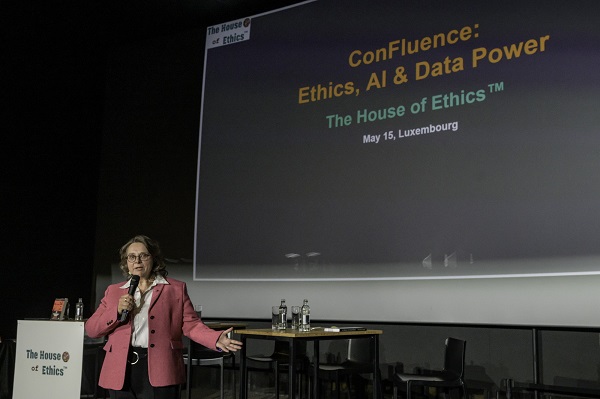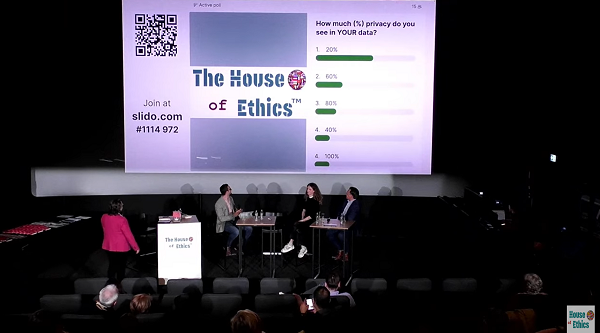 Katja Rausch, founder of The House of Ethics;
Credit: The House of Ethics
Katja Rausch, founder of The House of Ethics;
Credit: The House of Ethics
On Thursday 15 May 2025, The House of Ethics hosted its second interdisciplinary conference, “ConFluence: Ethics, AI & Data Power”, at Kinepolis in Luxembourg-Kirchberg; the hybrid event was also streamed online.
Key themes included data privacy, data ethics, cyber-ethics safety and data sovereignty.
Following an introduction by The House of Ethics founder Katja Rausch, guest speaker Dr Carissa Véliz, Professor of Philosophy and AI Ethics Researcher at the University of Oxford, joined remotely from the United Kingdom to speak about privacy as power. She commented on how people unknowingly relinquish privacy, how tech companies profit from this and how users can reclaim agency. She criticised devices such as AI smart glasses and warned of identity theft and the perils of biometric data misuse. The guest speaker highlighted the value of the analogue world, which is "much safer" and more meaningful than the digital world. She also stressed that “privacy is our collective endeavour” and posed the question: what kind of society do we want to live in and leave for future generations?
Next to speak was Dr Daniele Proverbio, Director of Interdisciplinary Research at The House of Ethics, who addressed “Data for People, Data for AI”. He delved into data ecosystems, emphasising the value of representative, statistically significant data, which is also meaningful, ethical and effective. He also emphasised the need for ethical AI literacy.
Edmund White, VP MedTech - Healthcare & MedTech Executive at AIBODY, subsequently explored organoid intelligence (OI), its potential for medical breakthroughs and ethical questions around consciousness, identity and responsible innovation. He called for more thoughtful oversight and less polarising narratives. The speaker described knowledge as a form of power, noting that there is a moral responsibility to use this wisely (e.g. for justice).
Anna Gorbatcheva, Senior Strategy and Market Intelligence Manager at climate tech company 1KOMMA5°, then spoke about energy, specifically electricity consumption. She discussed the energy trilemma: balancing energy security and equity with environmental sustainability. Automation and AI can help monitor usage patterns and support inclusive participation in the energy transition - although privacy must be maintained. She added that moving from fossil fuels to renewables will enhance energy sovereignty and access, thus supporting the democratisation and decentralisation of energy.
Prof. Dr Ingrid Vasiliu-Feltes, Digital Strategist and Deep Tech Diplomacy Advocate, joined remotely from Miami, US. She argued that the assertion that "data is power" is foundational, describing data as "strategic power" and as "geopolitical leverage" and energy as infrastructure (enabling power). She expanded on this "Data Power Trifecta", adding data autonomy to complete the “data power quadruplex”. The speaker advocated solutions based on harmonised cyber-ethics and an integrated and decentralised approach.
The subsequent roundtable, moderated by Dr Daniele Proverbio, addressed topics such as how AI-generated misinformation (e.g. deepfakes) erodes trust and how to address this, the lack of awareness around personal data extraction (e.g. through images), AI literacy, and energy as an enabler to AI access. Speakers called for more awareness but also systemic solutions, customised AI literacy and cross-disciplinary cooperation.
In closing, the speakers debated where true power lies in the digital age - the data itself, (new) technologies or people. There was general consensus that those who extract and utilise data (for example selling on data lists) hold the greatest influence. A fair balance of the system may require greater public awareness and regulation.
The conference ended with an audience Q&A session. The interactive event had also featured a Slido poll on data privacy - inviting reflection on how perspectives had evolved throughout the event.









